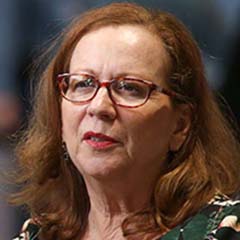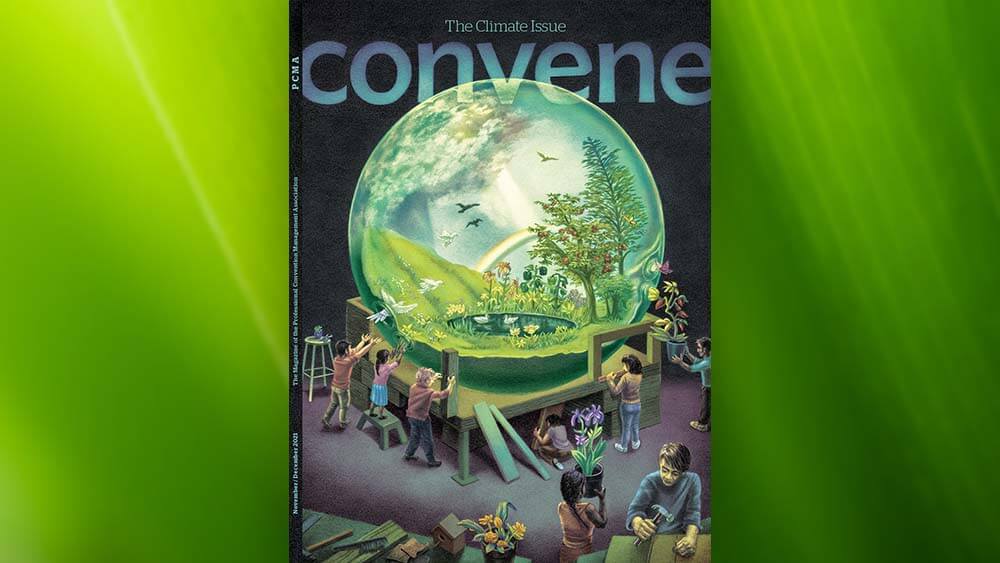Over the years, Convene has written scores of stories about business events and sustainability, including cover stories about the 2016 Climate Change Conference, the role of food waste and events in sustainability, and how event organizers can align with the United Nations’ global roadmap, the Sustainable Development Goals.
But for the first time in its 35-year-history, Convene has dedicated an entire issue to a single topic — the climate crisis and the role of the business events industry in addressing the challenge.
It’s a signal of how urgent the crisis has become — the UN Secretary General Antonio Guterres has called the UN’s recent Intergovernmental Panel on Climate Change (IPCC) report a “code red for humanity.” But it’s also a sign of a shift in mindset. Addressing climate change isn’t something that we can put off to the side or consider apart from any aspect of our business — it has a place in every conversation.
The following quotes come from 10 stories in the issue — find them and more in Convene’s Climate Issue. Find the turn-page version here.
“I don’t think anyone in the world would say we should never connect face-to-face again. But the narrative has now changed to: What is the carbon impact of the way we are choosing to connect?” — Fiona Pelham, CEO, Positive Impact; A ‘Watershed Moment’ for Events — and the World
 “I would like [climate change conferences] to be a transformative experience‚ so powerful that nobody would walk out … — if they’re there for a day, an hour, a week, or a month — without knowing that they are part of something.” — Laura Lopez, director of conference affairs for the United Nations Framework Convention on Climate Change (UNFCCC) UN Conference Director Wanted to ‘Make the Impossible Happen’
“I would like [climate change conferences] to be a transformative experience‚ so powerful that nobody would walk out … — if they’re there for a day, an hour, a week, or a month — without knowing that they are part of something.” — Laura Lopez, director of conference affairs for the United Nations Framework Convention on Climate Change (UNFCCC) UN Conference Director Wanted to ‘Make the Impossible Happen’
“Somehow, sustainability has become women’s work. I’m not trying to shame the men by any stretch of the imagination, but it certainly seems like there’s a lot of women having these discussions.” — Tara Milburn, founder and CEO of Ethical Swag; Making Conference Swag Sustainable
“Where can we look more like our clients beyond hiring and the typical conversations? As our food team started to explore [this diversity question], what really… bubbled to the top was the idea [that] the source of the food is something that we typically overlook.” — Kerry Painter, director and general manager, Raleigh Convention and Performing Arts Complex; Event F&B: Sense of Place, on a Plate

“When I think about post-COVID and how important it is for people to feel connected, to be mentally and emotionally grounded and supported, I think there’s an opportunity to tell a different story around health, safety, and welfare. All the work that we do supports the health and wellbeing for the people that we’re bringing together. The outcomes of climate goals, our carbon goals, matter to the health and welfare of people.” — Kimberly Lewis, board chair of Groundswell; How This Sustainability Leader Found Purpose in Her Field
“Wanting to make a local impact is understandable, [but] I draw attention to the issue of climate justice.” — Sarah Leugers, director of communications, Gold Standard; Events and Carbon Offsets: What You Need to Know
“It’s relatively easy being green for the span of an event or a campaign. How can we promote sustainable practices on the show floor that live on beyond the event and positively impact the communities and industries we serve? Let’s think outside the recycling bin.” — Kimberly Hardcastle-Geddes, president and chief marketing strategist of mdg; Going Beyond a Green Event: How to Make Sustainability a Priority
 “We’ve been talking about equity or inequity when you’re looking at job opportunities or partnering with other people of color in the industry. But environmental equity is extremely important as well, especially in a city like Baltimore, which is a minority majority city — a 63-percent African American population. It’s a segment of the African American population that is underserved. We want to do better.” — Al Hutchinson, Visit Baltimore President and CEO; Being a ‘Part of the Solution’
“We’ve been talking about equity or inequity when you’re looking at job opportunities or partnering with other people of color in the industry. But environmental equity is extremely important as well, especially in a city like Baltimore, which is a minority majority city — a 63-percent African American population. It’s a segment of the African American population that is underserved. We want to do better.” — Al Hutchinson, Visit Baltimore President and CEO; Being a ‘Part of the Solution’
“One of the biggest problems we face is solution aversion: We think the only solutions are negative, punitive, or harmful. In reality, nothing could be further from the truth. Real climate solutions benefit all of us — all, that is, except those whose quarterly returns depend on people continuing to use as much fossil fuels as possible.” — Katharine Hayhoe, Saving Us: A Climate Scientist’s Case for Hope and Healing in a Divided World, Authors Urge Humanity to Remain Hopeful
“I could go on about environmental sustainability, but one aspect that is often missed in planning a sustainable event is planning for social sustainability. What this means is looking at the impact your event has not just on the attendees, but also the surrounding community it is hosted in. Are your events and team diverse and inclusive? Are you making it accessible for everyone and all disabilities including invisible disabilities? True sustainability can’t happen without accessibility, diversity, and inclusion.’” — Meg Strahle, assistant sustainability advisor, The Bulb; Meg Strahle’s Journey to Creating Sustainable Event Experiences

